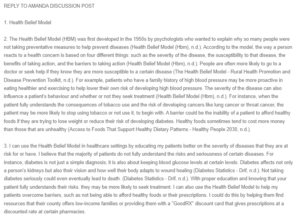
REPLY TO AMANDA DISCUSSION POST

Health Belief Model and its Applicability in Healthcare Settings
1. Health Belief Model
2. The Health Belief Model (HBM) was first developed in the 1950s by psychologists who wanted to explain why so many people were not taking preventative measures to help prevent diseases (Health Belief Model (Hbm), n.d.). According to the model, the way a person reacts to a health concern is based on four different things: such as the severity of the disease, the susceptibility to that disease, the benefits of taking action, and the barriers to taking action (Health Belief Model (Hbm), n.d.). People are often more likely to go to a doctor or seek help if they know they are more susceptible to a certain disease (The Health Belief Model – Rural Health Promotion and Disease Prevention Toolkit, n.d.). For example, patients who have a family history of high blood pressure may be more proactive in eating healthier and exercising to help lower their own risk of developing high blood pressure. The severity of the disease can also influence a patient’s behaviour and whether or not they seek treatment (Health Belief Model (Hbm), n.d.). For instance, when the patient fully understands the consequences of tobacco use and the risk of developing cancers like lung cancer or throat cancer, the patient may be more likely to stop using tobacco or not use it, to begin with. A barrier could be the inability of a patient to afford healthy foods if they are trying to lose weight or reduce their risk of developing diabetes. Healthy foods sometimes tend to cost more money than those that are unhealthy (Access to Foods That Support Healthy Dietary Patterns – Healthy People 2030, n.d.).
" name="description">Hello,
Thank you for sharing your post, Amanda. Your study of the Health Belief Model and its applicability in healthcare settings is one that I wholeheartedly concur with. Indeed, many patients might need help comprehending the gravity and dangers of some diseases. Healthcare providers can encourage patients to seek the right therapies and implement the required preventative measures by giving them thorough education and ensuring they understand their health issues’ effects. Removing obstacles like financial limitations can be extremely important in helping people maintain healthy lifestyles (Skoglund et al., 2022). Your solution of giving resources for low-income families and medication discount cards is an excellent method to deal with this issue and make it easier for people to access essential supplies.
I like that you brought up social support and how it affects people’s efforts to promote their health. A patient’s motivation to attain their health goals can be significantly influenced by the support and encouragement from family and friends (Mayberry et al., 2022). On the other hand, low-income family influences or exposure to depressing social media content can impede progress and demotivate people. Healthcare providers should be aware of this, assist patients in developing strong social networks, and give them sound advice on how to moderate their social media usage. Additionally, your focus on finding workable solutions to overcome obstacles, like offering resources and discount cards, exemplifies a proactive strategy for tackling the financial difficulties that may prevent patients from engaging in healthy activities. This aggressive intervention can significantly improve underprivileged communities’ access to healthcare and advance health equity. Your post emphasizes the significance of applying the Health Belief Model and acknowledging the importance of social support in obtaining favorable health outcomes. Great job!
Mayberry, L. S., El-Rifai, M., Nelson, L. A., Parks, M., Greevy, R. A., LeStourgeon, L., Molli, S., Bergner, E., Spieker, A., Aikens, J. E., & Wolever, R. Q. (2022). Rationale, design, and recruitment outcomes for the Family/Friend Activation to Motivate Self-care (FAMS) 2.0 randomized controlled trial among adults with type 2 diabetes and their support persons. Contemporary Clinical Trials, 122, 106956. https://doi.org/10.1016/j.cct.2022.106956
Skoglund, G., Nilsson, B. B., Olsen, C. F., Bergland, A., & Hilde, G. (2022). Facilitators and barriers for lifestyle change in people with prediabetes: a meta-synthesis of qualitative studies. BMC Public Health, 22(1). https://doi.org/10.1186/s12889-022-12885-8